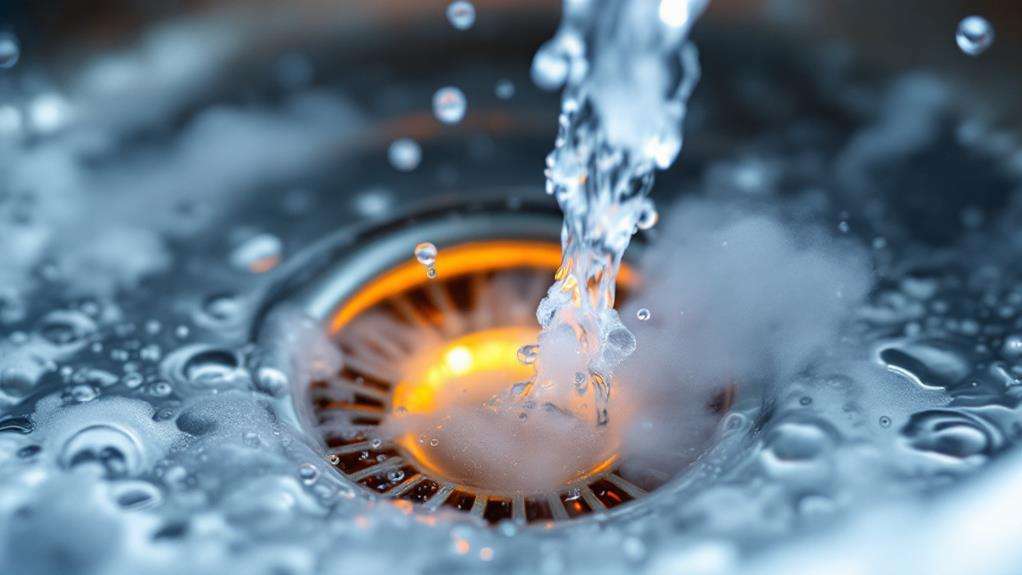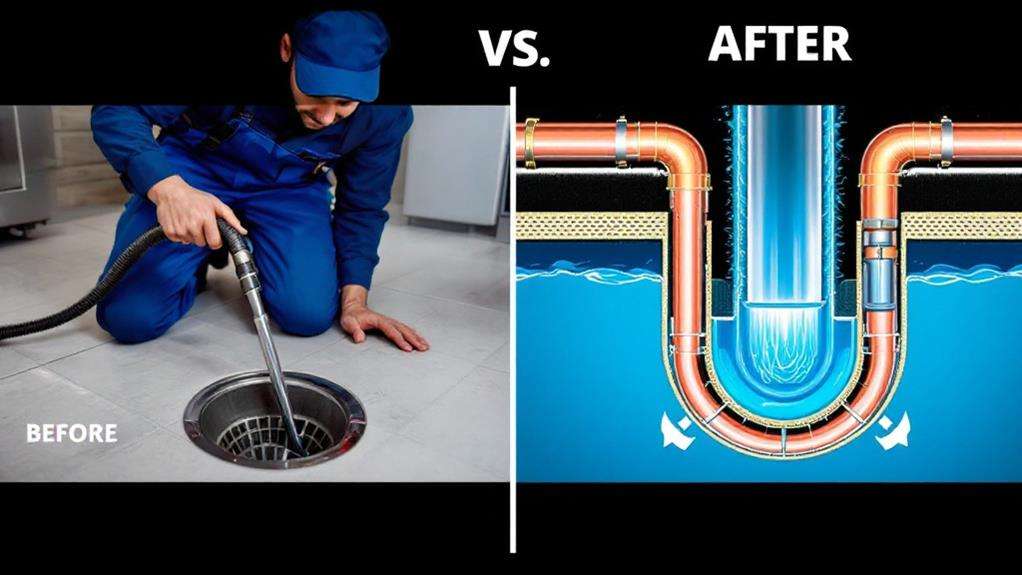How to Prevent Clogged Drains: Top Tips for Homeowners
To prevent clogged drains, start by installing drain screens to catch hair and debris. Be mindful of what you put down your drains, especially grease, which should be disposed of in the trash. Flush your drains weekly with hot water to dissolve residue and clear minor blockages. Use natural enzyme cleaners like vinegar and baking soda for eco-friendly maintenance. Don't forget to schedule regular professional inspections to detect potential issues early. By implementing these simple habits, you'll keep your plumbing system healthy and avoid costly repairs. Explore more ways to maintain clear drains and protect your home's plumbing.
Use Drain Screens
To effectively prevent clogged drains, installing drain screens is an essential first step. These inexpensive devices act as a barrier, catching hair, soap scum, and other debris before they can enter your pipes and cause blockages. You'll find drain screens available in various sizes and materials, suitable for different types of drains in your home.
For ideal results, ensure careful installation of drain screens in your sinks, showers, and bathtubs. Position them securely over the drain opening, making sure they fit snugly without gaps. Remember, proper maintenance is key to their effectiveness. Clean your drain screens regularly, removing accumulated debris to prevent water from backing up.
Don't forget about less obvious areas like your kitchen sink and laundry room. Food particles and lint can easily clog these drains, so using screens here is equally important. For garbage disposals, consider specialized screens that allow water to pass through while trapping larger food waste.
Proper Disposal of Grease
Over time, improper disposal of grease can lead to severe plumbing issues. You might be tempted to pour hot grease down the drain, but this practice can cause significant damage to your pipes. As the grease cools, it solidifies and sticks to the pipe walls, gradually building up and restricting water flow.
To properly dispose of grease, let it cool completely in a container. Once solidified, scrape it into your trash or compost bin disposal. For smaller amounts, you can use oil absorption techniques. Line a bowl with aluminum foil, pour in the cooled grease, and fold the foil around it before discarding.
Another option is to mix the grease with absorbent materials like coffee grounds or cat litter before throwing it away. This method helps contain the grease and prevents it from leaking in your trash bag.
Regular Hot Water Flushing

Beyond proper grease disposal, regular hot water flushing is an effective method for preventing clogged drains. This simple practice can help keep your pipes clear of buildup and reduce the risk of blockages. To implement this technique, you'll need to perform periodic rinsing with hot water throughout your plumbing system.
Start by running hot water through each sink, shower, and tub in your home for about 5-10 minutes. This helps to dissolve and flush away any accumulating soap residue, hair, or other debris. It's best to do this weekly, focusing on drains that see frequent use. For ideal results, use water that's as hot as possible without risking burns.
In addition to regular flushing, incorporate scheduled inspections into your maintenance routine. Every few months, check your drains for slow water flow, which could indicate a developing clog. If you notice any issues, address them promptly to prevent more severe blockages. By combining hot water flushing with regular inspections, you'll maintain healthier plumbing and reduce the likelihood of unexpected drain problems in your home.
Natural Enzyme Cleaners
Natural enzyme cleaners offer an eco-friendly and effective solution for maintaining clear drains. These biological agents work by breaking down organic matter that often accumulates in pipes, preventing clogs before they start. You can find commercial enzyme cleaners at most hardware stores, but you can also make your own using household ingredients.
One popular DIY option is vinegar-based cleaners. Mix equal parts white vinegar and hot water, then pour it down your drain. Let it sit for 30 minutes before flushing with hot water. This solution helps dissolve soap scum and mineral buildup while deodorizing your pipes.
Baking soda solutions are another powerful natural cleaner. Sprinkle half a cup of baking soda down the drain, followed by half a cup of vinegar. The fizzing action helps dislodge debris and neutralize odors. After 15 minutes, flush with hot water.
For stubborn clogs, try combining baking soda and salt. Mix 1/2 cup of each, pour down the drain, and follow with boiling water. This abrasive mixture can help break down tough buildup.
Using these natural enzyme cleaners regularly can help keep your drains flowing smoothly and reduce the need for harsh chemical treatments.
Professional Drain Maintenance

While natural cleaning methods are effective for routine maintenance, sometimes you need the skill of professionals to keep your drains in top shape. Professional plumbers have specialized tools and qualifications to thoroughly clean and inspect your drainage system, preventing major clogs and identifying potential issues before they become costly problems.
Consider establishing a regular drain inspection schedule with a trusted plumber. They'll use advanced techniques like video camera inspections to examine your pipes' condition and detect any buildup or damage. Most plumber recommendations suggest annual inspections for residential properties, but you may need more frequent checks if you have older plumbing or a history of drain issues.
Professional drain maintenance often includes high-pressure water jetting to remove stubborn buildup and tree root intrusions. They can also apply protective coatings to prevent future corrosion and clogs. Don't wait for a major blockage to occur; proactive maintenance can save you time, money, and stress in the long run. By combining your own routine care with professional services, you'll keep your drains remain clear and functional for years to come.
